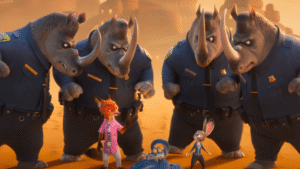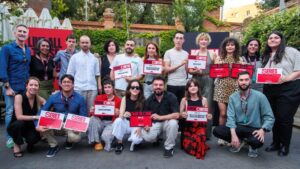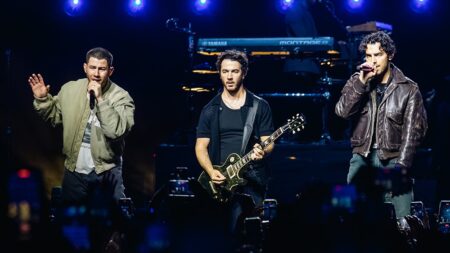It’s safe to say that very few shows that could feature performances by Gracie Abrams, Garth Brooks, George Clinton, Kristen Chenoweth, Dan & Shay, the Doobie Brothers, Debbie Gibson and what’s left of the Beach Boys, and have them all seem so honored and excited to be there.
Yet similar things happen every single year at the Songwriters Hall of Fame induction ceremony, the greatest awards show that most of the world knows nothing about. Established in 1969 and with over 400 inductees, the ceremony is a combination of a trade-organization social and a family reunion, bringing together the songwriting and publishing communities. For decades, it has been presided over — and kept in line by — its president/CEO, former Warner Music executive Linda Moran, who last year was absent for the first time in anyone’s memory due to a serious battle with leukemia, but thankfully she has returned to health and was back in force on Thursday night at the show’s longtime home of the Marriott Marquis in New York’s Times Square.
Garth Brooks (Photo by Theo Wargo/Getty Images for Songwriters Hall Of Fame)
Getty Images for Songwriters Hall Of Fame
Over the years we’ve seen global icons like Neil Diamond, Drake, Tom Petty, Bonnie Raitt, Justin Timberlake, Ariana Grande, Van Morrison, Eurythmics, John Prine, Leon Russell, Gordon Lightfoot, Dwight Yoakam, Elvis Costello and many others perform at the event, but also people you’ve barely heard of, even though you probably know a dozen of their songs — and all are treated equally in the eyes and ears of the Hall and the tight-knit songwriting and publishing community that attends the invite-only event every year.
We’ve seen Lady Gaga singing Four Non-Blondes’ hit “What’s Up” to Linda Perry; Stevie Nicks belting “The Rose” to Bette Midler; Emmylou Harris performing Eric Clapton’s heartbreaking hit “Tears in Heaven” for the song’s co-writer Will Jennings; Joe Walsh performing ELO’s “Don’t Bring Me Down” (and saying, “I always wanted to be in ELO — now I have”), and in 2011, the evening ended with Billy Joel and Garth Brooks duetting at the piano in matching Stetson hats.
The 2025 edition found the show’s standards as high as ever. Moran received a huge applause from the audience at the top of the show and spoke to the vibe by quoting SHOF chairman and legendary Chic songwriter-producer Nile Rodgers during her speech, saying “Nile said in his classic song ‘We Are Family,’ and the next generation has to remember that yes, this is about the love of music, but even more it’s about the people.” And with that, we were into the show.

George Clinton and Vernon Reid (screen shot)
The as-always psychedelically attired Living Colour (accompanied by the ace SHOF house band) kicked off the evening paying tribute to Parliament-Funkadelic mastermind George Clinton with a hard-funking version of that group’s 1974 classic “Cosmic Slop.” All four bandmembers then presented Clinton with his award, with vocalist Corey Glover asking the audience to raise their right hands and “pledge allegiance to the funk, and nothing but the funk” and guitarist Vernon Reid loading up with P-Funk references by calling him “the maggot overlord, the atomic dog, uncle jam himself!”
Clinton gave a brief but warm acceptance, speech, recalling his 1950s childhood in Newark, New Jersey, when there were “doo-wop singers on every corner and next thing you knew, you were hearing them on the radio.” He made that move himself, ultimately getting an audition at Motown Records with his group the Parliaments and scoring an early hit with 1967’s “I Just Wanna Testify.” He then sang the song with the house band, stomping across the stage in a beige pinstripe suit, sparkly gold captain’s hat and, significantly, a Sly and the Family Stone t-shirt, a tribute to his mentor and friend who died earlier this week. It was also the first time we’d ever seen Clinton, who usually tours with some approximation of P-Funk’s heyday of outrageous costumes and pyrotechnics and as many as two dozen musicians, in such a spare musical setting — and at 83, he can still hold the stage and delivering a gut-busting vocal.

Debbie Gibson (Photo by Theo Wargo/Getty Images for Songwriters Hall Of Fame)
Getty Images for Songwriters Hall Of Fame
Next up were a trio of songs by British hitmaker Tony Macaulay, whose career spans six decades, climaxing with an astonishing performance of the Foundations’ 1966 hit “Build Me Up Buttercup” performed by Debbie Gibson. She was a dynamo onstage, wearing a spangly minidress and high-heeled sandals, working every corner of the stage before going out into the audience, saying “Where’s Tony?,” finding him, singing to him and then racing back onstage in time to play a barrelhouse piano solo — all without missing a note. Even after that, she said, “When you get to perform a song like that, the song is the star.” Maybe it was a tie.
Next up, Dan & Shay took the stage to play a lightning-round medley of songs by record-smashing Nashville hitmaker Ashley Gorely (Variety’s Hitmakers Songwriter of the Year in 2023), that went by so fast that Shazam couldn’t have kept up, but we did hear Chris Stapleton’s “You Should Probably Leave,” Morgan Wallen’s “Last Night,” Post Malone’s “I Had Some Help,” and Luke Bryan’s “Play It Again” blaze past. They spoke of his 83 No. 1 singles, the way he “expanded the sound of Nashville without losing its heart,” and his powerhouse publishing company Taperoom Music, which has incubated the careers of multiple songwriters.

Dan Smyers and Shay Mooney (Photo by Theo Wargo/Getty Images for Songwriters Hall Of Fame)
Getty Images for Songwriters Hall Of Fame
Then Gorley’s 21-year-old daughter Sadie took the stage to pay tribute to her father with a short speech, recalling him “cancelling on writing sessions with iconic musicians to come to a school sporting event.” She then delivered a strong version of his song “You’re Gonna Miss This” accompanied by the house band. Finally, an emotional Gorley accepted his award, thanking the songwriting community and his family effusively, and saying how grateful he was that “none of them told me I was crazy, even though it was 11 years before I had a hit.”
Next, R&B maestro Teddy Riley took the stage to pay tribute to Rodney “Darkchild” Jerkins, who he’d actually met when the young hopeful was 16 years old, a moment captured in a photo from 1993 projected onto the video screen: For his birthday, Jerkins had asked his parents to drive him to Virginia to meet Riley — unannounced — they obliged, and even though Riley was working on songs for Michael Jackson that day, he took the time to meet with the young man. Jerkins kept in touch and before long was auditioning songs for Riley. “I heard his music and saw that he had his own sound: innovative soul.” In his speech, Jerkins thanked God most effusively, then his wife “for pushing me to be the best version of myself — sometimes a producer needs to be produced!,” and then his parents, as he recalled his father taking $1,200 out of his life insurance policy to buy his son Akai MPC 3000 Production unit. He also thanked Clive Davis, who was in the audience, remembering being rejected by him multiple times, but “The greatest way to be successful is to be turned down,” and finally scored with his hit for Whitney Houston, “It’s Alright, It’s OK.”
“I think you finally got it, Rodney,” he recalled Davis saying. “I think you finally got it.”

Astyn Turrentine, Heavenly Joy Jerkins, Hannah Joy Jerkins and Royal Jerkins (Photo by Theo Wargo/Getty Images for Songwriters Hall Of Fame)
Getty Images for Songwriters Hall Of Fame
He then literally conducted his four children — Rodney III, Hannah Joy, Heavenly Joy and Royal, ranging in age from 21 to 10 — along with the house band on his 1998 smash with Brandy and Monica, “The Boy Is Mine,” followed by a 10-song medley that included “Say My Name,” “It’s Not Right But It’s Ok,” “He Wasn’t Man Enough,” “If You Had My Love.” Ten-year-old Royal, playing cello, in particular had the eye of the tiger as he performed, watching his father closely; the elder Jerkins blew kisses at his children at the end of their performance.

Royal Jerkins a (Photo by Theo Wargo/Getty Images for Songwriters Hall Of Fame)
Getty Images for Songwriters Hall Of Fame
The evening took a turn to Broadway to honor living legend Stephen Schwartz, who in 50-plus years has written “Godspell,” “Pippin,” “Enchanted,” “Pocahontas” and of course “Wicked.” First, budding legends Pasek & Paul (“Dear Evan Hansen”) recalled meeting him when they were sophomores in college and “shamelessly” handing him a CD of their songs. Several months went by, then one day in class their phones buzzed and there was an email from Schwartz, who apologized for taking so long but he wanted to properly process their songs — and had written “ten pages of notes on every single song — it was the most unexpected and gracious thing to do.” They then recalled feeling slightly less special when they learned that Schwartz has shown similar generosity in mentoring many, many young writers over the years.

Kristin Chenoweth and Mary Kate Morrissey (Photo by Theo Wargo/Getty Images for Songwriters Hall Of Fame)
Getty Images for Songwriters Hall Of Fame
Admitting they’re songwriters not singers, regardless they rolled through a medley of Schwartz’s greatest songs including Miracles and “When You Believe” before ceding the stage to two major Broadway stars, Kristen Chenoweth — who noted that she was “the original Glenda” in the first production of “Wicked” — and Mary Kay Morrissey. The two sang a soaring medley of even more Schartz classics before presenting him with his award. He thanked many people, including the “songwriters I learned from — and stole from” before performing one of his less-known songs, which he did not name but felt was especially fitting for the occasion, about “what it’s like to be a writer in a room full of writers.”
Next up was one of the more controversial inductees in SHOF history, the Beach Boys’ Mike Love, whose induction was made even more pointed by the death of Brian Wilson, the group’s primary songwriter and his cousin, just two days before the ceremony. The two had famously battled for decades, and over the years many felt that Love has overstated his contributions to the group’s hits, and his profile with some has not been enhanced by his often-hostile far-right statements; on Wednesday, the day before the ceremony, he posted an effusive if revisionist tribute to Wilson on Facebook, then followed it two hours later with a bellicose anti-immigrant screed (which he has apparently deleted).
However, he wrote lyrics for several of the group’s major hits — there are many lyricists in the Hall of Fame — and his voice was a cornerstone of their sound. He kept it respectful during his induction, although he mentioned Wilson only very briefly: “I especially must thank my cousin Brian Wilson,” he said. “My first cousin by blood but brother in music, together we set the stage for some of the most successful music collaborations of all time.” He was introduced by actor-musician John Stamos, a former member of the group, who said he “didn’t just write songs but created a technicolor tableaux of the American dream.”

Mike Love and John Stamos (Photo by Theo Wargo/Getty Images for Songwriters Hall Of Fame)
Getty Images for Songwriters Hall Of Fame
Stamos joined the group for their performance of several of the group’s biggest hits, including “California Girls,” “I Get Around,” “Kokomo” and “Good Vibrations.”
In a classic SHOF turnaround, an 84-year-old honoree was then followed by a 25-year-old, Gracie Abrams, who was introduced by her low-key but vitally important collaborator Aaron Dessner of the National (and of course Taylor Swift and Bon Iver), who called her a “gifted lyricist and melody writer” and one of the most natural talents he’d ever worked with — which is saying something — and highlighted her “unique phrasing and rhythms,” which he calls “Gracie-isms.” “She is unique in that her work shows such a range, and she’s just getting started.”
Abrams was characteristically humble in her acceptance, saying “I’m not at all sure what I’m doing here but this truly means more to me than you will ever know.” She spoke of her multiple influences, especially Joni Mitchell’s “Blue,” and thanked Dessner effusively: “He really took a chance on me and I will love him for it forever.” She followed it with a solo rendition of “Free Now.”
Finally, as the time neared 11 p.m., the audience was stunned to see the hulking, black Stetson-and-denim-clad figure of Garth Brooks stride onstage and launch straight into the Doobie Brothers’ 1973 hit “Long Train Runnin’,” delivering a verse and chorus before pivoting directly into their classic “China Grove.” He thundered across the stage and pumped his fist at the house band and raised his arms to the audience like the stadium headliner he is.
Brooks then walked over to the podium and recalled his youthful experiences with the band’s music: “I’m the youngest of six, and my brother, the other youngest, got an 8-track tape of ‘Best of the Doobies’ that my dad wouldn’t let us listen to because their name had ‘doobie’ in it,” to laughter. He concluded by saying “Some people said, ‘I can’t believe you’re here, but I’d be here for these guys tomorrow night and the next night — it’s an honor.”
Largely because of their jokey-stoner name, the Doobie Brothers often are not taken as seriously as they otherwise might have been, considering their formidable battery of hits and how thoroughly they dominated American FM radio throughout the 1970s. But their presence on this hard-earned stage went a long way toward affirming their musical legacy.

(L-R) Michael McDonald, Patrick Simmons, and Tom Johnston of The Doobie Brothers (Photo by Theo Wargo/Getty Images for Songwriters Hall Of Fame)
Getty Images for Songwriters Hall Of Fame
The band’s three main songwriters, Tom Johnston, Pat Simmons and Michael McDonald, all gave gracious acceptance speeches, but McDonald’s last words got the biggest laugh of the night. He said earlier in the day he’d taken a photo with Stamos and texted it to his family, “trying to get some cred,” and his wlife immediately texted him back, writing, “’Wow, he still looks like a rock star — but you look like someone’s deranged grandmother.”
The band then performed one song each per writer, beginning with Simmons’ bayou ode “Black Water,” following with McDonald’s soulful anthem “Takin’ It to the Streets,” and concluding with one of their most indelible songs, Johnston’s “Listen to the Music.” The human voice naturally loses strength and versatility as it ages, and by the time it approaches 80 years old, as all three Doobies are, even the greatest singers are usually left with half of their original power, or less. But somehow, Johnston’s sharp, reedy voice sounded almost as it did 50 years ago, taking soulful liberties with the song’s melodies and showing no weakness at all.
And in a very trouble time, it’s hard to think of a more fitting send-off for this latest installment of the Songwriters Hall of Fame ceremony than a song with that title and message.
Read the full article here








